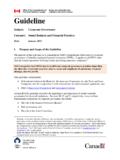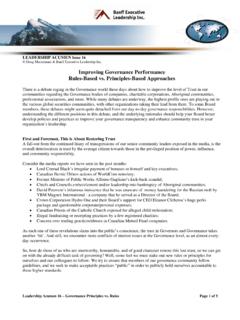Transcription of CORPORATE GOVERNANCE AND THE CHALLENGES FACING …
1 CORPORATE GOVERNANCE AND THE CHALLENGES FACING COMPANIES POST ENRON AND PARMALAT Jennie S. Mills Milford International Associates Limited This article will summarise the recent CORPORATE GOVERNANCE developments in Europe, discuss the potential guardians and suggest that companies can meet the CHALLENGES FACING them by embracing qualitative CORPORATE GOVERNANCE . The EU s response to the US GOVERNANCE scandals. Comments that the problems of Enron, WorldCom and Tyco could not happen in Europe are misleading. Experts have acknowledged that even in Britain, where CORPORATE GOVERNANCE practices are recognised as some of the best in the world, such problems could occur. The key question has been how can standards be improved whilst not damaging the collegiate nature of European boards and inhibiting the decision making process of companies.
2 Not all the current global economic woes can be attributed to a loss of investor confidence springing from a few, albeit high profile, CORPORATE scandals in the US. It is generally recognised in Europe that any introduction of onerous legislation in this field could act as a disincentive to company management and boards to make the business decisions essential for sustainable profitability and economic growth. The European approach to the problems highlighted by the US CORPORATE scandals should not be regarded as an indication of complacency, merely a concern that initiatives be appropriate and sustainable throughout what will, in the near future, be a financial market of 25 countries.
3 In order to achieve this single financial market the EU introduced a fast track legislative approach following the report of the so called Group of Wise Men led by Baron Lamfalussy. The EU Commission issued the Financial Services Action Plan which sets out the road map for the Single Financial Market and regularly monitors progress. Until Enron, the EU Commission had always accepted that CORPORATE GOVERNANCE was a matter for national governments. Thus, the Financial Services Action Plan identified as, the only initiative in this sector, the conduct of a study on the number and nature of CORPORATE GOVERNANCE codes and standards within the Union. This study, published in January 2002 identified more than 35 codes within the EU.
4 Whereas in Britain there several codes, each adding to best practice as the standards were reviewed and improved, in other member states there were competing codes issued by different bodies. However, the study concluded that the number of codes within the EU do not act as a barrier for business within the Union because all the codes were based, to a large extent, on the OECD Principles. However, reflecting the increasing profile of CORPORATE GOVERNANCE the EU Commission widened the mandate of the Group of High Level Company Law experts, to include review of CORPORATE GOVERNANCE . The High Level Group Report The report, delivered over a year ago, focused on the internal elements of CORPORATE GOVERNANCE within the EU.
5 Whilst the report stopped short of recommending an EU directive, it did emphasise the role of the EU in facilitating the co-ordination of CORPORATE GOVERNANCE standards and most significantly their monitoring and enforcement. The fundamental recommendation was to use disclosure as a regulatory tool. Thus it recommended that each country should designate one CORPORATE GOVERNANCE code as the lead code for compliance by all listed companies. These companies would be required to include in their annual report and accounts a coherent and descriptive statement covering the elements of those CORPORATE GOVERNANCE standards and practices they apply and those they do not. As such the report endorses the so-called comply or explain approach used in the OECD Principles and several national codes.
6 The key advantage of this approach is that it allows companies flexibility and time to progressively improve their CORPORATE GOVERNANCE standards and recognises that what might be appropriate in one company may not be so in another. Whilst companies listed in London are familiar with such an approach, many others will find this a new challenge, particularly if the statements are to be meaningful. Responsibility for this statement is to rest with the board as a whole which under the two tier board structure, adopted by most civil law jurisdictions, includes the supervisory board members. Slovakia has already adopted this approach and the BSSE listing rules require listed companies to report on their compliance with the Slovak CORPORATE GOVERNANCE code in the current annual reports.
7 This initiative has the active support of the UFT. The EU Communication and Action Plan The EU Commission substantially endorsed the Group s report in a Communication and Action Plan in late May and together these documents set out the EU s approach to implementation of the report. The Action Plan identifies priorities on a short, medium and long term basis, and uses several tools, comply and explain , recommendations and directives. Recommendations, which the Commission will draft, address some short term priorities namely the strengthening of the role of independent directors, and supervisory board members, the role and composition of board committees and board remuneration.
8 Here one should expect that the devil will be in the detail and perhaps we can expect the most radical approach as there will be greatest flexibility in implementation. Slovakia again is acting on this aspect of the EU Action Plan, with the issue of a consultation document, available from the BSSE website , which addresses the roles of the board members and which is based on a similar clarification by the Netherlands. Comments are welcome on this proposed definition with a cut off date of April 30, 2004. Directives, will address enhanced disclosure requirements, including collective responsibility of board members for financial and key non financial statements, efficient shareholder communication including cross border voting, disclosure of group structure, cross border mergers, cross border transfer of the company seat and enhanced disclosure by institutional investors of their voting policies.
9 Some commentators are concerned that by seeking to introduce directives the Commission will have to accept standards that are lower than optimal in order to achieve the necessary consensus. One only has to look at the fraught history of the EU takeover directive to understand this concern. The guardians of CORPORATE GOVERNANCE - the role of directors? There appears to be a general consensus, within the US, UK and the rest of the EU, that the primary guardians of the GOVERNANCE of a company should be the board members. There are many different models, based on the single and two tier approaches. However it is clear that in all of these the most effective guardians will be those board members who are independent of the management of the company.
10 Traditionally, the role of the non executive board members (whether in a single or two tier structure) has been rather cosmetic. Many regarded the role as recognition of their position in society rather than one with duties and responsibilities. This has changed dramatically in the past decade and increasingly so post Enron where there was considerable criticism that the non executives (highly respected and independent individuals) were asleep on the watch to say the very least. A recent study on the time spent on board matters by non executives reveals that directors in the US now spend upwards of 19 hours per month on board business, up from 2001 when it was 13 hours. In the UK the figure is currently 25 hours per month.





